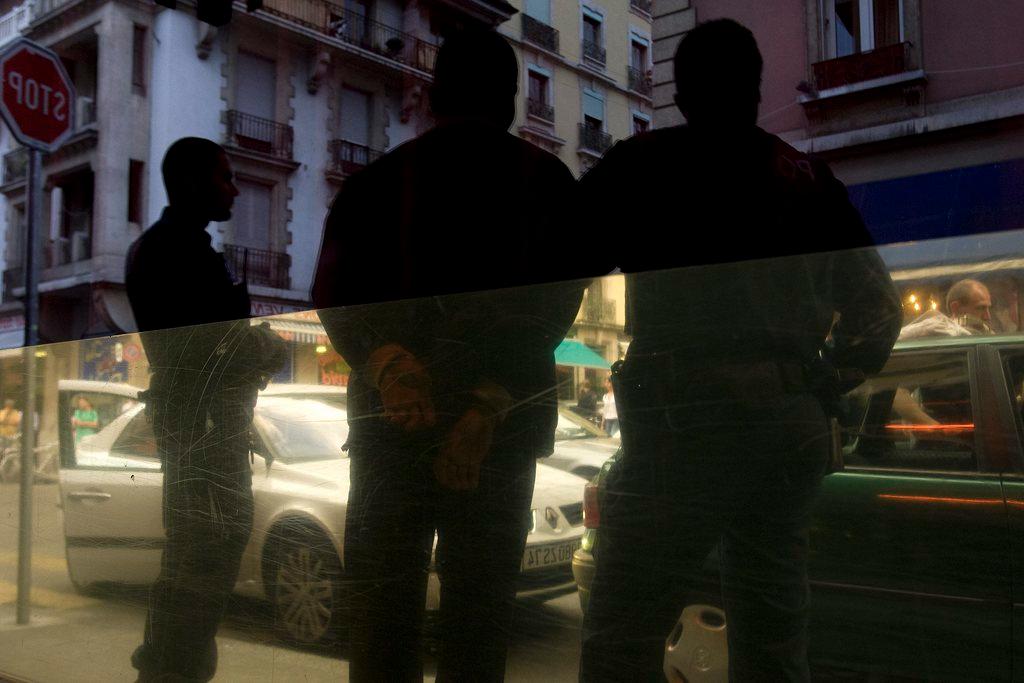
‘I prefer dealers to a deserted street’

Can drug dealers and locals coexist peacefully? A study by Geneva University has analysed the phenomenon in parts of the city centre. The research was published as a drug-dealing controversy rages in neighbouring Lausanne.
“The dealers look pretty harmless a priori,” explains Marie, a 30-year-old who lives and works in Geneva. “I find that a neighbourhood where there are always people at any time of the day and night is more reassuring than a neighbourhood that’s deserted at night when you come home late.”
Marie was one of dozens of Geneva residents, shop and business owners, and West African street dealers interviewed in the central Pâquis and Jonction neighbourhoods for a study into urban co-existence by Geneva University sociologists Maxime Felder External linkand Loïc PignoloExternal link. Their research was published in the May edition of the Sociologie journalExternal link.
According to their study, certain inhabitants resented dealers standing around “on their own or in groups waiting for their customers, chatting or on their mobile phones” due to the sense of injustice over their apparent impunity.
But other locals felt they could “tolerate their presence and sometimes – like Marie – went so far as to value it in the streets they believed were not lively enough”, the authors wrote.
The Geneva study was published last month amid a heated debate in neighbouring Lausanne over drug dealing on the city’s streets by up to 200 West Africans.
On TuesdayExternal link, the local authorities and police announced that more officers would be made available to combat the problem in certain parts of the city centre, following complaints from residents, a campaign co-led by Swiss film director Fernand Melgar and a small street protest.
The director, known for his documentaries on migrants, the Swiss asylum system and humanist viewpoints, sparked controversy by publishing photos of alleged drug dealers waiting outside a local school and describing his neighbourhood as a “lawless zone”.
Certain familiarity
Despite having very different lives and not knowing each other, regular contacts between locals and dealers has led to a certain degree of familiarity and tolerance, the sociologists went on.
Forty-year-old Sonia described how her attitude had softened over time.
“At first it revolted me, as there are schools here. But then I realized that the children were not becoming druggies,” she said in the report. “I started to appreciate them [the dealers], as they were respectful to me. They know that I live in the neighbourhood. I have never been attacked or stopped to sell me drugs. Sometimes they say hello and I always answer them politely.”
Nonetheless, the researchers found marked differences in the attitudes of shop owners and residents.
For shop owners and businesses, the ‘dealer problem’ is more about “a risk of a loss of image rather than a security risk”, the authors said.
Dealers’ outlook
The sociologists also interviewed 15 dealers from West Africa. Most had either filed an asylum request to stay in Switzerland or had been rejected by the authorities. They describe dealing as their way of surviving. They add that dealers operate “almost freelance” rather than as part of an organised mafia gang and are not especially proud of their work.
“In general, the dealers see drug dealing as something immoral. They try in various ways to show that they care about their coexistence with the rest of the population, for example, by avoiding violence as much as possible or by not being too insistent with passers-by,” the authors said.
However, this co-existence is fragile and can change rapidly, such as in 2012, when a dealer was spotted in a Pâquis school yard. Local politicians, school directors, parents and the press got involved in the controversy, which led to an increased police presence around schools.
The authors conclude that in the two Geneva neighbourhoods studied “co-existence is partly self-regulated, but it is also backed up by policing and by community workers who help school representatives, residents, the police force and drug dealers to maintain a dialogue.”

More
Zurich is Europe’s weekend cocaine capital

In compliance with the JTI standards
More: SWI swissinfo.ch certified by the Journalism Trust Initiative































You can find an overview of ongoing debates with our journalists here . Please join us!
If you want to start a conversation about a topic raised in this article or want to report factual errors, email us at english@swissinfo.ch.